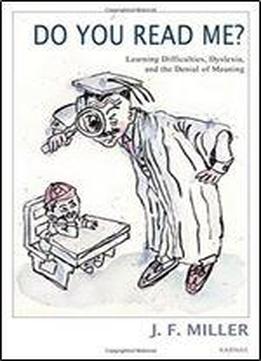
Do You Read Me?: Learning Difficulties, Dyslexia And The Denial Of Meaning
by J.F. Miller /
2015 / English / PDF
707.8 KB Download
A fascinating and compelling exploration of the learning process for parents, teachers, and anyone with an interest in education. Reading and writing are fundamentally about the communication of meaning. Yet, when a child has difficulty in learning to read and write, the one area that is never seen as having any relevance is the child's life experiences. The author's contention is that the concept of dyslexia is something that has been invented, rather than discovered, in order to evade the question of meaning and the understanding of the individual. Based on the author's thirty years' experience of both educational psychology and analytical therapy, the book sets out a radical approach to learning difficulties in which the primary assumption is that there will usually be underlying emotional conflicts, tensions, and anxieties. Any learning disability is thus more likely to be the symptom of less-evident, personal difficulties, rather than a problem in itself. The book examines, with examples, typical patterns of personal and emotional difficulty that give rise to learning problems.A fascinating and compelling exploration of the learning process for parents, teachers, and anyone with an t in education.
Reading and writing are fundamentally about the communication of meaning. Yet, when a child has difficulty in learning to read and write, the one area that is never seen as having any relevance is the childs life experiences. The authors contention is that the concept of dyslexia is something that has been invented, rather than discovered, in order to evade the question of meaning and the understanding of the individual. This is examined as part of a culture in which child-rearing and education are increasingly depersonalizing, and children are viewed as assets or commodities rather than individuals.
Based on the authors 30 years experience of both educational psychology and analytical therapy, the book sets out a radical approach to learning difficulties in which the primary assumption is that there will usually be underlying emotional conflicts, tensions, and anxieties. Any learning disability is thus more likely to be the symptom of less-evident, personal difficulties, rather than a problem in itself.
The book examines, with examples, typical patterns of personal and emotional difficulty that give rise to learning problems. There is also a section dedicated to diagnostic procedures and special teaching approaches which can be employed by the non-specialist.











